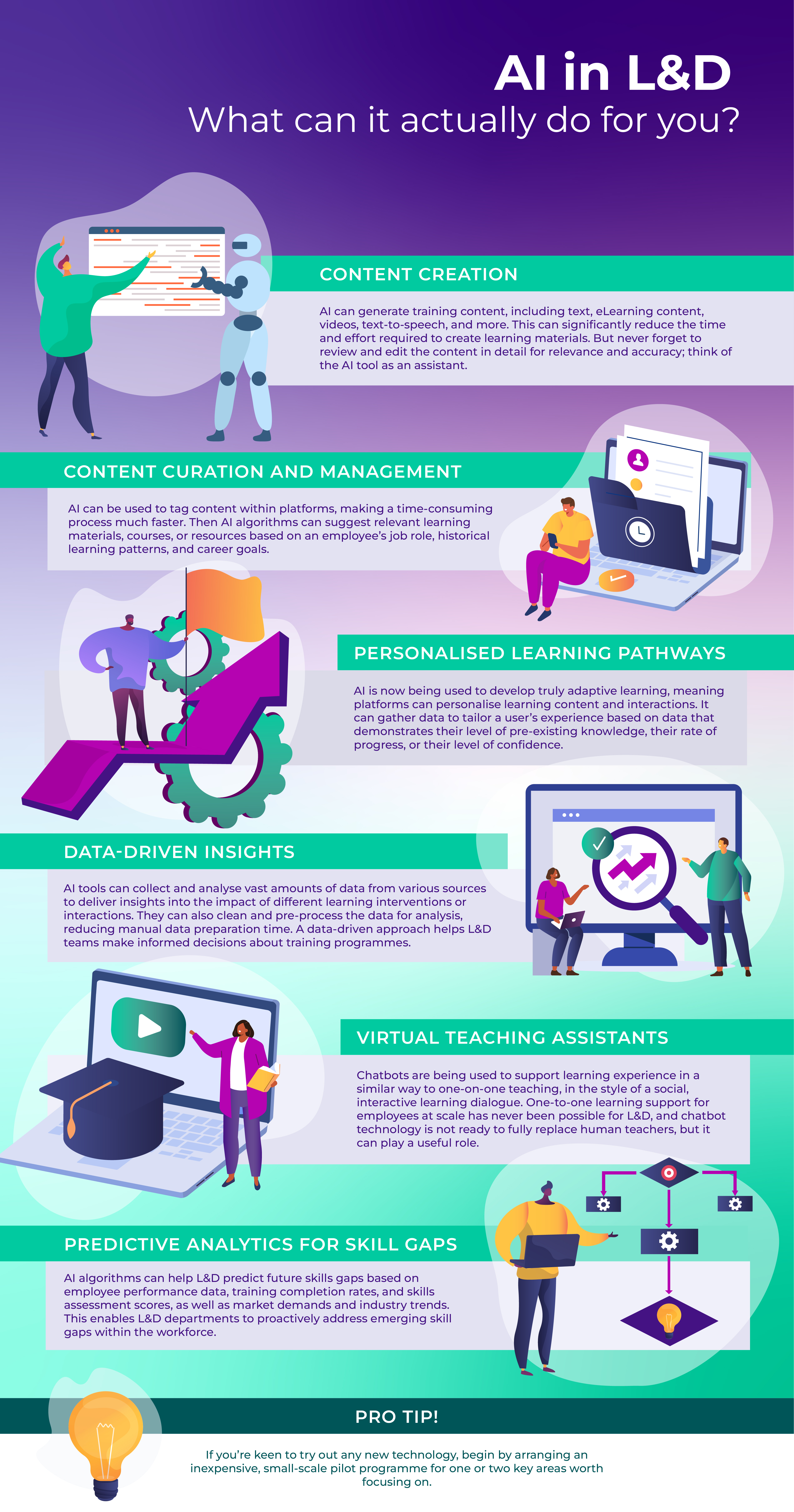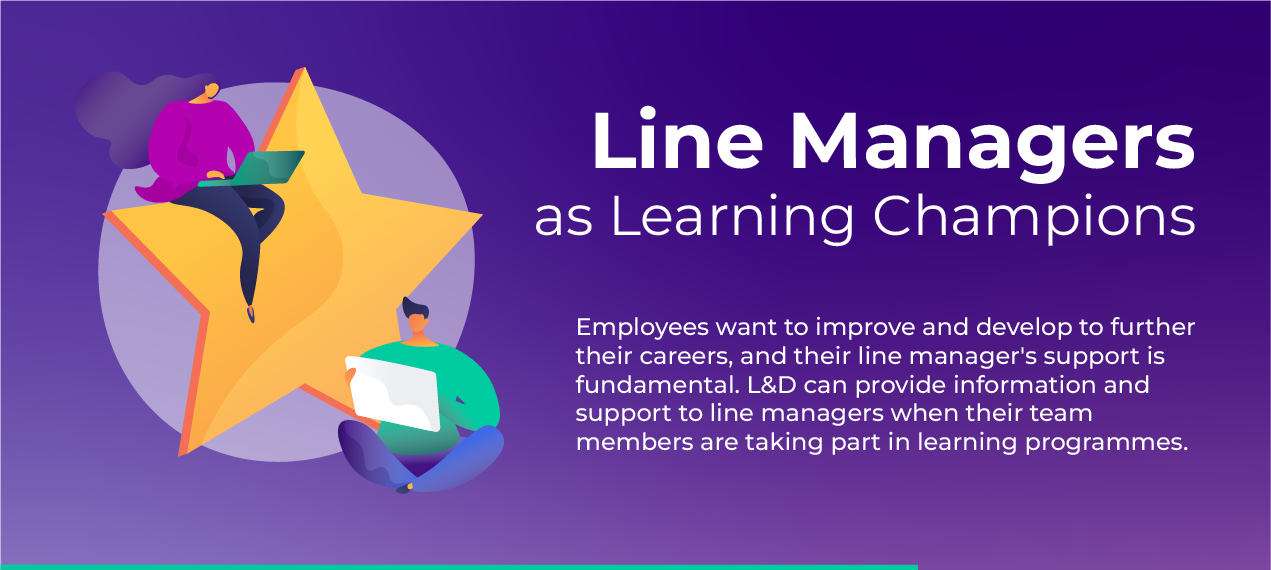Even before the pandemic, the workplace was changing; people were already becoming more mobile and increasingly remote. New expectations have changed the rules, and new talent is hard to find, so we need to ensure we can grow from within.
What has changed dramatically and only very recently is that learning technology has finally come out of the dark ages and has caught up with the digital transformation we see elsewhere. This shift has enabled us to become much more ambitious as providers of learning services, to try new techniques and methods, to add value like never before.
How to reduce barriers to Organisational Learning
By building great services we increase accessibility at the point of need and reduce barriers to organisational learning and employee development. These efforts will have a positive effect on the perceived value of learning across the workforce - the “learning culture”
Most of us realise the complexity of training and development in the workplace. With the exception of prescriptive internal programmes, learning can be very fluid, opportunistic and in the moment.
Imagine the added complexity with geographically dispersed staff, contractors, freelance staff, new hires, sales professionals and retail staff.
How can we begin to imagine the learning services we need to build to address this complexity and to let learning flow naturally, on the job and easily at hand?
We look at some typical corporate learning interventions and ideas for services that can be put in place for organisational learning and knowledge management.
|
TYPES OF TRAINING / LEARNING PROGRAMS |
SUGGESTED SERVICE OR SOLUTIONS |
|
Small, medium or large scale internal programmes (process changes, internal comms, new practices, etc.) |
Blended learning solution: Introductory: self directed microlearning and resources. Intermediate: introductory + access to managed community, extra curation and nudging, low scale virtual classroom. Enhanced: intermediate + large scale virtual classroom rollout with supporting resources, further enhanced with spaced practice tools for reinforcement and demonstrable mastery and analytics. |
|
Leadership development |
Introductory: access to self-directed off-the-shelf libraries of multi-modal content and resources (on an LXP). Training by exception. Intermediate: Introductory above, plus flipped workshops. Enhanced: High-end workshop facilitation and mentoring with access to digitally-curated thought leadership, book summaries and other relevant resources. |
|
Personal and professional development, management skills, emerging leaders |
Access to an LXP and comprehensive multi-modal curated content and resources. Further enhanced by manager support function, custom pathways and analytics. Training and workshops by exception. |
|
Professional Sales: product and process |
Introductory: Access to LM /LXP and easily developed (high standard) bespoke content and resources covering sales process and product training. Intermediate: + resources at the point of need using xapi solution to embed learning resources in e.g CRM solution. Enhanced: + active mobile content platform with community management, nudging and access to experts. Additional data driven spaced practice for demonstrable knowledge mastery and analytics. AR/VR solutions for physical goods (and in the near future for soft skills and communication challenges). |
|
Technical training (custom) and/or |
Introductory: Standard bespoke digital learning assets and resources. Intermediate: Introductory above, + bespoke AR/VR solution. Enhanced: Intermediate + AR/VR solution directly connected to experts or suppliers or consultants for on the job support. |
|
Retail Sales |
Intermediate: standard, modern, well designed custom content, preferably mobile friendly on standard LMS Enhanced: mobile first active LXP solution with community nudging and sharing. |
|
Compliance |
Introductory: standard, modern, well designed custom content, preferably mobile friendly on standard LMS or LXP Alternative: adaptive spaced practice tool for reinforcement and demonstrable mastery and analytics |
|
Software application end user and process |
Introductory: standard, modern, well designed custom content, preferably mobile friendly on standard LMS or LXP |
|
Software development, ICT technical |
Access to LXP and comprehensive multi modal curated content and resources. Further enhanced by manager support function, custom pathways and analytics. Training and workshops by exception |
|
New hire / onboarding |
Mobile first active platform solution with community nudging and sharing Specific onboarding/ pre boarding application |
Themes to building services and reducing common barriers to learning
-
-
Use of existing LMS
Many companies already have an LMS in place, the traditional software to distribute and manage learning across the organisation. The LMS will remain relevant for some time yet as a hub that can deliver learning services, particularly compliance training programs, classroom scheduling and blended learning programs. -
Use of off the shelf content for generic skills
Approached properly, the use of ready made, off the shelf content can be transformational as a service. Its relative cost per person as well as the quantity of topics covered is a major feature. The benefits are immense. The experience and impact is much greater when distributed through a Learning Experience Platform which is why we recommend Percipio. Otherwise it is possible to integrate content on your existing platform. -
Tactical use of next generation / mobile first platforms
Not every learning problem can or should be solved through the traditional LMS. Tactical and swift deployments of lighter, more modern, high user experience platforms such as Teach on Mars or learningCloud can solve many problems. In this way we make the platform and its service accessible to the team needing the solution. Its administration and use can easily be devolved to that team. Content authoring on these next generation platforms is straightforward and your learning services provider should be able to help you to provide this solution with ease. -
First steps to data driven learning - spaced practice / repetition
Spaced practice / repetition tools are a worthwhile addition to the digital learning toolkit. Delivering new knowledge through short learning interventions can reduce time to competence and can adapt to each user for their individual success. Demonstrable knowledge acquisition and retention data is on hand to show you who is finding certain topics challenging. We recommend Verify, a managed service a data driven approach. -
A planned approach to blended learning services
The concept of blended learning is by no means new but with today’s enhanced learning technology we now have many more options available to us. When applying the concept to run internal programmes, think of a spectrum of services that can be used to shape solutions for any problem, of course using great learning design principles. We recommend Scale by Logicearth.
-
|
TYPE 1: LOW INTERVENTION, HIGH SELF DIRECTION |
TYPE 2: MEDIUM INTERVENTION, HIGH SELF DIRECTION 2 |
TYPE 3: HIGH INTERVENTION, MEDIUM SELF DIRECTION |
|
|
|
|
Best for reasonably straightforward topics and communication solutions |
Best for more technical topics where demonstrable knowledge mastery is more important |
Best for large scale, wider audiences for maximum impact at manageable costs |
The precise nature of each organisation's barriers to learning will be different. However, there are common themes and ideas in the solutions available. By applying the same learning design principles and using the best available infrastructure, a great many challenges can be addressed.
Having built your service offering, you time is now better spent:
- Marketing the services internally, particularly to managers,
- Dealing with exceptional learning problems by exception, and,
- Spending time building a future skills strategy.
If you want agnostic support or advice, our team are only too willing to share their knowledge and ideas. We do not believe in the square peg, round hole mentality - Logicearth deliver learning solutions based on individual organisational needs.
We procure and implement learning technologies, develop curriculum, design bespoke content and provide ongoing support around deployment and communications to ensure successful continuous engagement.
Challenge us!Tell us your learning problems and we will find a solution that works for you from our vast range of services and platforms. Get in touch now:










Was this article helpful?